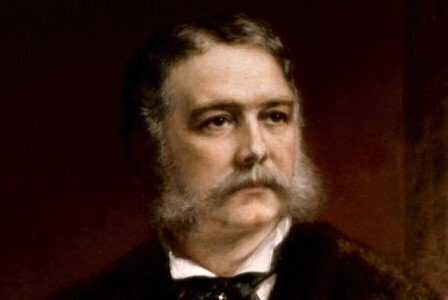In the midst of the current debate over Ted Cruz’s eligibility for the presidency, Constitution Daily looks back at five other birthplace controversies involving candidates.
 Currently, GOP front runner Donald Trump wants Cruz to legally prove that the Canadian-born Senator is qualified to run for the White House. Cruz has insisted that “the son of a U.S. citizen born abroad is a natural-born citizen.”
Currently, GOP front runner Donald Trump wants Cruz to legally prove that the Canadian-born Senator is qualified to run for the White House. Cruz has insisted that “the son of a U.S. citizen born abroad is a natural-born citizen.”
Article II, Section 1, of the U.S. Constitution requires that “[n]o person except a natural born citizen … shall be eligible to the Office of President.” Cruz was born in Canada in 1970, with his father being from Cuba and his mother coming from Delaware in the United States.
Recent thoughts from constitutional experts seem to side with Cruz’s argument, but not all experts agree – including Cruz’s own law professor from Harvard. Laurence Tribe recently told the Guardian in a series of email exchanges that “there is no single, settled answer. And our Supreme Court has never addressed the issue.”
A related issue is the eligibility of a candidate born in the United States to foreign-born parents. Specifically, the first sentence of the 14th Amendment reads, “All persons born or naturalized in the United States, and subject to the jurisdiction thereof, are citizens of the United States and of the state wherein they reside.” A later Supreme Court decision, United States v. Wong Kim Ark, seemingly reinforced the theory than people born on American soil are American citizens. But not everyone agrees with that, pointing to the clause “subject to the jurisdiction thereof” as proof the 14th Amendment’s drafters has limited intent when drafting that provision.
In 2012, Trump has publicly doubted President Barack Obama’s eligibility to hold office, siding with theories that Obama might have been born outside of the United States, giving birth to the term “birther.”
Here’s a look at five other birthplace controversies, going back to the original birther debate in 1880.
Chester Alan Arthur
In 1880, Arthur ran as the vice presidential candidate on the James Garfield ticket for the Republican Party. Arthur became President after Garfield’s death in 1881 and there were rumors – spread by campaign rivals - that Arthur had been born in Canada, and not Vermont, as he claimed.
Arthur’s father was born in Ireland and his mother was born in the United States. If Arthur was born in Canada, his opponents claimed, there was a citizenship issue.
Marquette Law professor J. Gordon Hylton pointed out in a 2009 blog post that if Arthur was born in Canada “he was technically foreign-born, and in 1829, citizenship in such cases passed to the child only if the father was a United States citizen, and, of course, at this point Arthur’s father was still a citizen of the British Empire.”
Charles Evans Hughes
There was also a birthplace controversy over the 1916 presidential candidacy of Charles Evans Hughes, the Republican who narrowly lost to Woodrow Wilson.
There were claims that Hughes was ineligible for office because his father was born in the British Empire in Wales. Hughes was born in Glen Falls, New York, and his mother was also born in New York state; he was also born before the 14th Amendment was ratified. An attorney, Breckinridge Long, apparently challenged Hughes’ qualifications in a 1916 Chicago Legal News article.
Barry Goldwater
The 1964 Republican presidential candidate was born in the Arizona Territory in 1909 before Arizona was admitted as a state. Goldwater was born in an organized incorporated territory that was formed in 1863, an act that is interpreted to grant U.S. citizenship to folks born there.
For more on the citizenship distinction between incorporated and unincorporated territories, see the recent news coverage about the efforts of American Samoa residents to become full American citizens.
George Romney
As a candidate for the 1968 presidency, Romney faced questions because he was born in Chihuahua, Mexico in 1907 at a Mormon colony. His parents were born in the Utah Territory before Utah became a state, and they were American citizens. Romney’s parents chose United States citizenship for their son. The Romneys left Mexico when George Romney was very young, due to the Mexican Revolution.
Democrats questioned Romney’s ability to run for President in 1967 when congressman Emmanuel Celler, a Democrat, publicly expressed "serious doubts" about Romney's eligibility. A New York Law Journal article later sided with Romney, who insisted he was a natural-born citizen.
John McCain
Senator McCain faced questions in the 2008 election, since he was born in the Panama Canal Zone in 1936. His parents were born in Iowa and Oklahoma. McCain’s father was a Navy admiral.
In addition to having two parents who were American citizens, McCain was born in a region that was under the control of a United States treaty agreement, which was considered as a sovereign United States territory.
In 2008, Tribe and Theodore Olsen, another well-known legal expert, wrote in a law journal article that “the circumstances of Senator McCain’s birth satisfy the original meaning and intent of the Natural Born Citizen Clause, as confirmed by subsequent legal precedent and historical practice.”
Still, there was on-going talk during the McCain campaign on the Internet that the Senator wasn’t eligible for the White House, which led to several unsuccessful lawsuits. The Senate passed a nonbinding resolution declaring McCain as eligible to be President.







